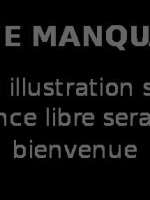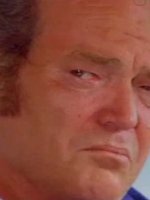Ted Rusoff est un Acteur et Scénariste Américain

Ted Rusoff (born 1939 in Winnipeg, Canada – died September 28, 2013 in Rome) was an American actor, musician, voice dubbing artist, writer of film-scripts, poetry, and fiction, opera-coach and stage-director, adaptor/translator from and into various languages of synchronized dialogue for the dubbing of films and cartoons.
As a dubbing director he is known for his extensive work for the English-language versions of foreign — predominantly Italian — films. He has also sync-adapted, acted in, and directed the dubbing of films shot in Turkish, Finnish, Greek, Danish, Hebrew, and Korean as well as the standard European cinema languages.
Rusoff started his career as a singer, appearing in operas, musical comedies, and on the road in various cities in the USA and Canada with his guitar during the folk-singing boom of the late 1950s and early 1960s. He specialized in songs in many foreign languages, including Ghanaian and Maori. He also appeared in nearly all the Gilbert and Sullian operas, doing a wide variety of roles. He toured with a trio called The Catch Club, along with his fellow music-students from UCLA, David Reznick and Larry Pack. They sang catches, or rounds, from the English Restoration period, and appeared throughout North America and recorded an album. He traveled to Europe in 1963 and, using his knowledge of languages, began overseeing the dubbings into Italian, French, and German of films that had been shot in English and produced in America by American International Pictures, the company that had been founded by his uncle, Samuel Z. Arkoff. Since then, he has worked as sync-adapter and dubbing director of more than 500 films, and as a dubber his voice can be heard in more than 1300 films, providing the voice for numerous leading men as well as many villains in a number of Italian cult favorites such as The Whip and the Body (1963), Deep Red (1975), Beyond the Darkness (1979) and many others. He has also worked extensively dubbing films into Italian and French, often supplying foreign languages or accents.
Since the early 1980s, Rusoff has also done much work as an actor in film and television. He started out with supporting roles - often playing authority figures or religious characters such as priests, rabbis or monks. His earliest film roles were in Joe d'Amato's horror film Absurd (1981) and in Marco Ferreri's Tales of Ordinary Madness (1981), based on the works of Charles Bukowski, and Franco Zeffirelli's "La Traviata" alongside Plácido Domingo (1981). He also acted together with his wife, Carolynn de Fonseca, in the Pia Zadora starring vehicle The Lonely Lady (1983), and he and de Fonseca played husband and wife, the parents of Mussolini's mistress Claretta Petacci in the TV miniseries Mussolini and I (1985), with Bob Hoskins in the title role.
Throughout the rest of the 1980s and 1990s, Rusoff acted in some low-budget B-movies such as Catacombs (1988), where he plays a monk; Sinbad of the Seven Seas (1989) with Lou Ferrigno, where he plays the keeper of the torture chamber; and the Jean-Claude Van Damme flick Double Team (1997), where he again plays a monk, this time one who is also a computer-genius. However, he also had roles in many acclaimed films such as Martin Scorsese's The Last Temptation of Christ (1988), alongside Max von Sydow in the TV movie Cellini: A Violent Life (1991), in which he played Pope Paul III, Tinto Brass' The Voyeur (1994) and, in a film about the life of Pope John XXIII, The Good Pope (2002), as a rabbi working with Bob Hoskins (playing Angelo Roncalli, the future pope) in his efforts to free a shipload of Jews in Istanbul and send them to Israel. Rusoff also played the Chief Elder in Mel Gibson's film The Passion of the Christ (2004) and Julius Caesar's Greek slave Strabo in the popular TV series Rome (2005–2007). As an actor he has so far appeared in more than 70 films. Fluent in many languages, he is often called upon for work as language/accent/dialogue consultant for dubbings, theater, and cinema. He has worked many times as a stage-director for regular plays and as stage-director and music-coach for opera in houses in Marseilles, Copenhagen, Munich, Prague, Riga, Montivideo, Tokyo, Auckland, and elsewhere. He has been active as a choral director, known for his "Liebslieder Waltzes" and other choral masterpieces by Brahms, as well as the music of composers of the Baroque period.
Source : Wikidata
Ted Rusoff

Ted Rusoff (born 1939 in Winnipeg, Canada – died September 28, 2013 in Rome) was an American actor, musician, voice dubbing artist, writer of film-scripts, poetry, and fiction, opera-coach and stage-director, adaptor/translator from and into various languages of synchronized dialogue for the dubbing of films and cartoons.
As a dubbing director he is known for his extensive work for the English-language versions of foreign — predominantly Italian — films. He has also sync-adapted, acted in, and directed the dubbing of films shot in Turkish, Finnish, Greek, Danish, Hebrew, and Korean as well as the standard European cinema languages.
Rusoff started his career as a singer, appearing in operas, musical comedies, and on the road in various cities in the USA and Canada with his guitar during the folk-singing boom of the late 1950s and early 1960s. He specialized in songs in many foreign languages, including Ghanaian and Maori. He also appeared in nearly all the Gilbert and Sullian operas, doing a wide variety of roles. He toured with a trio called The Catch Club, along with his fellow music-students from UCLA, David Reznick and Larry Pack. They sang catches, or rounds, from the English Restoration period, and appeared throughout North America and recorded an album. He traveled to Europe in 1963 and, using his knowledge of languages, began overseeing the dubbings into Italian, French, and German of films that had been shot in English and produced in America by American International Pictures, the company that had been founded by his uncle, Samuel Z. Arkoff. Since then, he has worked as sync-adapter and dubbing director of more than 500 films, and as a dubber his voice can be heard in more than 1300 films, providing the voice for numerous leading men as well as many villains in a number of Italian cult favorites such as The Whip and the Body (1963), Deep Red (1975), Beyond the Darkness (1979) and many others. He has also worked extensively dubbing films into Italian and French, often supplying foreign languages or accents.
Since the early 1980s, Rusoff has also done much work as an actor in film and television. He started out with supporting roles - often playing authority figures or religious characters such as priests, rabbis or monks. His earliest film roles were in Joe d'Amato's horror film Absurd (1981) and in Marco Ferreri's Tales of Ordinary Madness (1981), based on the works of Charles Bukowski, and Franco Zeffirelli's "La Traviata" alongside Plácido Domingo (1981). He also acted together with his wife, Carolynn de Fonseca, in the Pia Zadora starring vehicle The Lonely Lady (1983), and he and de Fonseca played husband and wife, the parents of Mussolini's mistress Claretta Petacci in the TV miniseries Mussolini and I (1985), with Bob Hoskins in the title role.
Throughout the rest of the 1980s and 1990s, Rusoff acted in some low-budget B-movies such as Catacombs (1988), where he plays a monk; Sinbad of the Seven Seas (1989) with Lou Ferrigno, where he plays the keeper of the torture chamber; and the Jean-Claude Van Damme flick Double Team (1997), where he again plays a monk, this time one who is also a computer-genius. However, he also had roles in many acclaimed films such as Martin Scorsese's The Last Temptation of Christ (1988), alongside Max von Sydow in the TV movie Cellini: A Violent Life (1991), in which he played Pope Paul III, Tinto Brass' The Voyeur (1994) and, in a film about the life of Pope John XXIII, The Good Pope (2002), as a rabbi working with Bob Hoskins (playing Angelo Roncalli, the future pope) in his efforts to free a shipload of Jews in Istanbul and send them to Israel. Rusoff also played the Chief Elder in Mel Gibson's film The Passion of the Christ (2004) and Julius Caesar's Greek slave Strabo in the popular TV series Rome (2005–2007). As an actor he has so far appeared in more than 70 films. Fluent in many languages, he is often called upon for work as language/accent/dialogue consultant for dubbings, theater, and cinema. He has worked many times as a stage-director for regular plays and as stage-director and music-coach for opera in houses in Marseilles, Copenhagen, Munich, Prague, Riga, Montivideo, Tokyo, Auckland, and elsewhere. He has been active as a choral director, known for his "Liebslieder Waltzes" and other choral masterpieces by Brahms, as well as the music of composers of the Baroque period.
Le plus souvent avec
Filmographie de Ted Rusoff (13 films)
Acteur

The Scarlet Worm (2011)
, 1h33Origine Etats-Unis
Genres Western
Thèmes La grossesse, Sexualité, Erotique, Prostitution
Acteurs Dan van Husen, Brett Halsey, Michael Forest, Ted Rusoff
Rôle Print's Attorney
Note51%





Print Harris works as a bounty hunter in early 1900s America. He has a flair for conducting his killings in a theatrical or "poetic" fashion to give his profession more meaning and legitimacy. A wealthy ranch owner Mr. Paul (Brett Halsey) hires Print to eliminate a Dutch immigrant brothel owner Heinrich Kley (Dan Van Husen)who allegedly aborts the unborn children of his prostitutes, as well as to train a young ranch hand named Lee in the art of killing. Print decides to use Lee to infiltrate Kley's business and work for Kley as protection, purposefully luring a posse of cowboys into the brothel in order to murder them, and show off his usefulness. Kley immediately enlists Print to cover a wide variety of duties while entrusting him with his unique philosophy regarding business, religion, and the necessity of prostitution. Matters become complicated when Lee falls in love with one of Kley's prostitutes and informs her of the plan to murder him.

La nativité (2006)
, 1h41Réalisé par Catherine Hardwicke
Origine Etats-Unis
Genres Drame, Fantasy, Historique, Péplum
Thèmes Afrique post-coloniale, La grossesse, Noël, Religion, Sexualité, La bible, Représentation de Jésus Christ, La virginité
Acteurs Keisha Castle-Hugues, Shohreh Aghdashloo, Oscar Isaac, Hiam Abbass, Stanley Townsend, Ciarán Hinds
Rôle Schafhirte
Note68%





Le film s'ouvre sur une scène de flashforward mettant en scène le massacre des Innocents. Un an avant cet évènement, à Jérusalem, Zacharie reçoit une vision de l'archange Gabriel, qui lui annonce que sa femme Élisabeth donnera naissance à un fils malgré leur vieillesse. Dans le même temps, à Nazareth, la jeune Marie est fiancée sur décision de ses parents — Anne et Joachim — à un charpentier nommé Joseph. Peu de temps après, Marie est visitée par l'archange Gabriel, qui lui annonce qu'elle tombera enceinte du fils de Dieu et qu'elle devra le nommer Jésus. Il lui révèle par ailleurs que sa cousine Élisabeth est également enceinte. Après en avoir reçu l'autorisation de ses parents, elle s'en va rendre visite à cette dernière, qui connaît miraculeusement l'origine divine de sa grossesse. Marie assiste ensuite à la naissance de Jean-Baptiste, puis revient à Nazareth enceinte, à la grande stupéfaction de Joseph et de ses parents, qui craignent que celui-ci l'accuse de fornication, un péché punissable de lapidation selon la Loi mosaïque. Au début, Joseph ne croit pas Marie mais décide toutefois de ne pas l'accuser. Dans la nuit, il reçoit à son tour la visite de l'archange Gabriel, qui lui parle du plan de Dieu pour le fils de Marie, conçu par le Saint-Esprit. Joseph croit alors Marie et lui demande pardon d'avoir douter d'elle.

La Passion du Christ (2004)
, 2h7Réalisé par Mel Gibson
Origine Etats-Unis
Genres Drame, Historique
Thèmes Afrique post-coloniale, Religion, Sexualité, La bible, Religion juive, Représentation de Jésus Christ, La virginité
Acteurs Jim Caviezel, Maia Morgenstern, Monica Bellucci, Hristo Chopov, Rosalinda Celentano, Mattia Sbragia
Note72%





Les douze dernières heures de la vie de Jésus de Nazareth, la Passion : Jésus prie au mont des Oliviers et résistant à la tentation de Satan. Capturé par les autorités juives, Jésus est ensuite flagellé après sa dénonciation par Judas auprès du Grand Prêtre Caïphe et de sa cour. On voit ensuite son jugement par le préfet romain Ponce Pilate et son passage devant Hérode aboutissant à sa condamnation à mort. Le film est entrecoupé de flash back sur les moments principaux de la vie publique du Christ, comme le Sermon des Béatitudes. Le film s'achève par la montée de Jésus au Calvaire, sa crucifixion avec Marie et Marie-Madeleine pour témoins, puis sa résurrection.

Nightworld: Lost Souls (1999)
, 1h30Origine Etats-Unis
Genres Drame, Science-fiction, Horreur
Thèmes Maladie, Folie, Le handicap, L'autisme
Acteurs John Savage, Barbara Sukowa, Richard Lintern, Ted Rusoff, Jean-François Wolff, Christian Erickson
Rôle Humphrey Garrett
Note53%





Victor Robinson has just moved into a country home with his family. When his son, Jesse, finds an old Edison invention and begins to play it, he hears the sounds of children laughing and playing. This is followed by Victor's autistic 12-year-old daughter, Meaghan, painting and singing; this is surrounded by strange occurrences around the house. When Victor discovers that two children were murdered in the area years before, he believes they are trying to contact him; he also believes that their neighbor is responsible for the murders.

Riddler's Moon (1999)
, 1h30Réalisé par Don McBrearty
Origine Etats-Unis
Genres Drame, Science-fiction
Acteurs Corbin Bernsen, Kate Mulgrew, Daniel Newman, Daniel Newman, Miles Anderson, Finbar Lynch
Rôle Pastor
Note58%





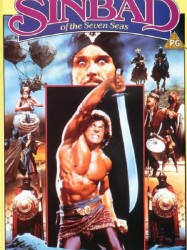
Sinbad (1989)
, 1h33Réalisé par Enzo G. Castellari, Luigi Cozzi
Origine Italie
Genres Science-fiction, Fantasy, Action, Aventure
Thèmes La mer, Transport, Films pour enfants
Acteurs Lou Ferrigno, John Steiner, Ennio Girolami, Alessandra Martines, Cork Hubbert, Massimo Vanni
Rôle Torture Chamber Keeper
Note43%





Une mère pour faire endormir son enfant lui conte les aventures du marin Sinbad. Ce dernier pour aider un prince à conquérir le cœur de sa princesse et sauver la ville de Bassorah de l'emprise du sorcier Jaffar doit retrouver cinq pierres magiques. Son voyage le conduira ainsi que son équipage sur l'île des amazones et sur l'île des morts où il affrontera son double.
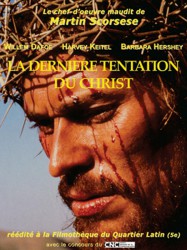 , 2h44
, 2h44Réalisé par Martin Scorsese
Origine Etats-Unis
Genres Drame, Historique
Thèmes Afrique post-coloniale, Religion, Sexualité, Diable, La bible, Représentation de Jésus Christ, Uchronie, La virginité
Acteurs Willem Dafoe, Harvey Keitel, Barbara Hershey, Harry Dean Stanton, Steve Shill, David Bowie
Note74%





Comme tous les hommes, Jésus vit dans le péché et dans la peur. Il veut vivre la vie d'un homme normal et désire Marie Madeleine. Mais Dieu l'a choisi pour être le Messie, pour être le Sauveur de l'humanité. Après avoir découvert sa vraie nature lors d'un voyage dans le désert, il commence à prêcher la bonne parole et à accomplir des miracles. Il compte de plus en plus de disciples, dont le premier d'entre eux, Judas, et s'oppose aux prêtres juifs.

Zombi 3 (1988)
, 1h35Réalisé par Lucio Fulci, Bruno Mattei, Claudio Fragasso
Origine Italie
Genres Science-fiction, Action, Horreur
Thèmes Maladie, Film post-apocalyptique, Religion, Le futur, Zombie, Épidémie, Politique, Dystopique, Film catastrophe
Acteurs Deran Sarafian, Mike Monty, Massimo Vanni, Luciano Pigozzi, Bruno Mattei, Claudio Fragasso
Rôle General Morton (voice) (uncredited)
Note49%





Un groupe de terroristes dérobe un gaz toxique, lequel va contaminer l'un d'entre eux et provoquer sa mort. Il se fera ensuite incinérer par les militaires dépêchés sur place, ce qui provoquera une fumée nocive contaminant les habitants locaux, les transformant en zombies. Alors que des scientifiques s’efforcent de trouver un antidote, les militaires décident d'exterminer toutes les populations présentes dans la zone contaminée, une zone qui cependant ne cesse de s’étendre.
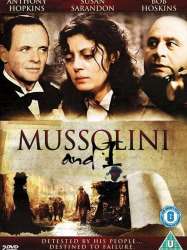
La Chute de Mussolini (1985)
, 2h10Réalisé par Alberto Negrin
Origine Etats-Unis
Genres Drame, Guerre, Biographie, Historique
Thèmes Politique
Acteurs Susan Sarandon, Anthony Hopkins, Bob Hoskins, Annie Girardot, Barbara De Rossi, Dietlinde Turban Maazel
Rôle Francesco Saverio Nitti
Note61%





The film starts just before World War II and shows the political and personal side of Benito Mussolini aka Il Duce's fall from power until his death and the end of the war. It delves into Il Duce's relationship with his son in-law, daughter, wife, mistress, and admiration of Hitler.

Horrible (1981)
, 1h36Réalisé par Joe D'Amato, Michele Soavi
Origine Italie
Genres Science-fiction, Horreur, Slasher
Thèmes Film post-apocalyptique, Religion, Le futur, Tueur en série, Zombie, Le handicap, Politique, Dystopique
Acteurs Ted Rusoff, George Eastman, Annie Belle, Edmund Purdom, Katya Berger, Lucía Ramírez
Rôle Doctor Kramer
Note53%





Un être mystérieux, au pouvoir de guérison phénoménal, multiplie les crimes atroces et déroute les forces de l'ordre.
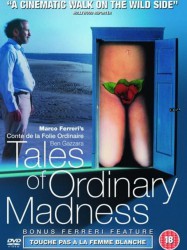
Conte de la folie ordinaire (1981)
, 1h41Réalisé par Marco Ferreri
Origine France
Genres Drame
Thèmes Alcoolisme, Maladie, Psychotrope, Sexualité, Erotique, Prostitution, Thriller érotique
Acteurs Ben Gazzara, Ornella Muti, Susan Tyrrell, Tanya Lopert, Tobin Bell, Roy Brocksmith
Note66%





Charles Serking, poète anarchiste et ivrogne, vit dans une banlieue de Los Angeles peu ragoûtante et mène une vie d'oisiveté. On le suit dans ses aventures et rencontres sexuelles. La vie de Serking va prendre un tournant décisif quand il rencontre Cass, jeune mi-ange mi-démon, qui se prostitue dans les quartiers chics et a pris l'habitude de s'automutiler. Ils ont une relation orageuse et trépidante.
Scénariste

La leggenda del Titanic (1999)
, 1h24Réalisé par Orlando Corradi
Genres Animation
Thèmes La mer, Transport, Le Titanic, Film catastrophe, Catastrophe navale
Acteurs Vittorio Guerrieri, Jane Alexander, Jane Alexander, Ferruccio Amendola, John Stone, Keith Scott
Note14%





In modern-day New York City an old mouse named Conners tells his grandchildren the supposedly "true" story of the RMS Titanic.
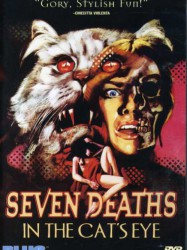
Les Diablesses (1973)
, 1h33Réalisé par Antonio Margheriti
Origine Allemagne
Genres Thriller, Horreur, Policier
Acteurs Jane Birkin, Hiram Keller, Françoise Christophe, Venantino Venantini, Doris Kunstmann, Anton Diffring
Note56%





En Écosse, un meurtrier sévit dans le vieux château des MacGrieff, dont la demeure semble frappée d’une terrible malédiction, celle du « chat tueur ». Corringa, nièce de la châtelaine Lady Mary, décide de mener sa propre enquête avec l’aide de son bizarre cousin James…
 Connexion
Connexion
